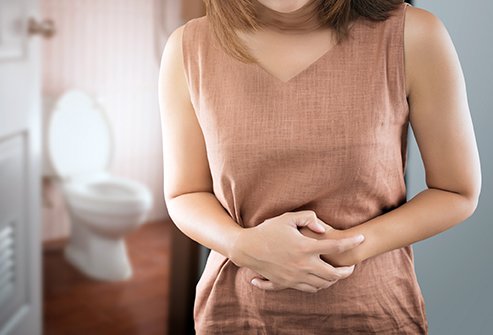What Is the Difference Between Fecal Impaction and Constipation?
What is constipation and fecal impaction?

Talking about your bowels can be an awkward conversation to have. However, when it comes to diagnosing complications with your bowel movements, it’s important to address issues before they get worse. But how can you tell the difference between constipation and fecal impaction, and which one is worse?
While the two conditions are similar, they have some differences that can lead to severe complications.
What is constipation?
Constipation is described as having infrequent bowel movements, usually less than three a week. Occasional constipation is a normal occurrence, but chronic constipation can lead to further complications and signal underlying problems. Chronic constipation is recurring and can inhibit your day-to-day tasks.
What is fecal impaction?
Fecal impaction is a complication of chronic constipation. Eventually, your long-term constipation can lead to a large lump of dry stool getting lodged in your rectum. This stool is difficult to pass, but it can also lead to severe complications if untreated.
Symptoms of constipation and fecal impaction
The symptoms of the two conditions are very similar. Keeping an eye out for the different symptoms is important for diagnosis and seeking further assistance.
Symptoms of constipation
If you are having less than three bowel movements each week, you may also need to check for the following additional symptoms:
- Your stools are dry, hard, or lumpy.
- You feel bloated or nauseated.
- You have frequent stomach aches or cramps.
- When you do have a bowel movement, you don’t feel completely emptied afterward.
- When you do have a bowel movement, you have to strain, and the stool is difficult to pass.
Symptoms of fecal impaction
The symptoms of fecal impaction are similar to constipation. Here are a few of the unique symptoms that differ:
- Pain in the lower back or abdomen
- Leaking stool or experiencing sudden watery diarrhea
- Nausea and vomiting
- Swelling in the abdomen
- Changes in urination patterns
- Difficulty breathing
- Rapid heartbeat
- Lightheadedness
Causes of constipation and fecal impaction
The causes of constipation and fecal impaction are similar since fecal impaction is a severe form of constipation.
Causes of constipation
When food passes through your digestive system, the colon absorbs water from it. However, if the colon’s muscle contractions are sluggish or slow, the colon absorbs too much water. This causes the stool to become dry and hard by the time it reaches the end of the digestive tract.
This slow process of moving dry stool through the digestive system causes constipation.
Constipation can be caused by:
- Reactions to certain medications
- Lack of exercise
- Dehydration
- Lack of fiber in your diet
- Irritable bowel syndrome
- Delaying your bowel movements
- Major lifestyle or habit changes
- Previous problems with the digestive system
- Excessive use of laxatives
Causes of fecal impaction
Because fecal impaction is an advanced form of constipation, the causes are similar. You are at risk of fecal impaction when you have constipation for a long time.
Additionally, if you are taking laxatives and suddenly stop, your digestive system may “forget” how to process stool on its own and put you at a higher risk for fecal impaction.
Diagnosis of constipation and fecal impaction
Diagnosing constipation or fecal impaction requires similar examinations:
- A physical exam to check your general health
- A digital rectal exam (DRE) to examine the rectum for any abnormalities
- X-rays of your abdomen to check for any abnormalities and isolate the blockage
Diagnosing constipation
Certain examinations can be performed to test for specific causes of constipation:
- Proctoscopy: an examination of the rectum using a proctoscope for viewing and removing tissue to be examined for disease.
- Colonoscopy: similar to a proctoscopy. The doctor will use a colonoscope to check for abnormalities, such as polyps or cancer.
- Fecal occult blood test (FOBT): tests for the microscopic presence of blood in your stool.
Diagnosing fecal impaction
Slightly more invasive tests may be performed to check for fecal impaction:
- Sigmoidoscopy: an examination of the rectum and lower colon to locate abnormalities or fecal impaction.
- Blood tests: these will isolate signs of disease, antibodies, tumor markers, or to check on treatment progress.
- Electrocardiogram (EKG): an EKG can help determine abnormal conditions related to the heart and electrolytes.
Treatments of constipation and fecal impaction
Preventing constipation and fecal impaction requires lifestyle and dietary changes. However, removing the initial blockage is the first step.
Treating constipation
Because constipation is less severe than fecal impaction, taking the time to change your lifestyle and diet can provide relief. Good lifestyle habits to reduce constipation include:
- Eating a well-balanced diet with fiber-rich foods.
- Drinking plenty of fluids to stay hydrated.
- Exercising regularly to promote intestinal activity.
Be careful when taking laxatives as they can potentially worsen symptoms. Consult your doctor if you find that lifestyle changes are not helping and your current laxatives aren’t working.
Treating fecal impaction
The first step in treating a fecal impaction is to remove the blockage. This is typically done with an enema to soften and lubricate the stool. However, further steps may be required to manually remove the stool. Surgical procedures are rarely needed.
Once the fecal impaction is removed, your doctor will discuss what may have caused the blockage and recommend lifestyle and dietary changes. Keeping a record of your diet, activity, and bowel movements can help you and your doctor determine a regimen that works for you.
